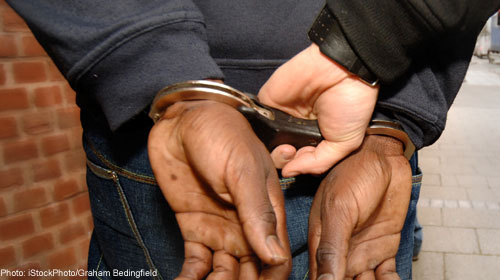We Know That Stop-and-Frisk is All Kinds of Horrible: So Why Is it Expanding Nationwide?


"I was going to the store for my mother. And then when I came out the building I see my uncle and he's coming from the way I'm going and we walk back to the store. And they [the police] just pulled up and hopped out and tried to pull up and take us. So I'm like whoa, too much is happening."
That quote is just one of many from a recent Vera Institute of Justice study that expresses the combination of fear, shock, and alienation experienced by young men and women who have been affected by the NYPD's Stop-and-Frisk policy. The study, "," released last Thursday, examines the experiences of those growing up in the neighborhoods in New York City where people are most likely to be stopped. The study surveyed over 500 young adults and conducted in-depth interviews nearly 50 more, and paints a rich picture of what actually happens during stops, and why this matters for the safety of the most heavily policed communities. [Full disclosure: I assisted with data collection for the project while at the Vera Institute].
The researchers found that the effect of Stop and Frisk on police-community relations is devastating: With each time a person is stopped, "respondents are eight percent less likely to report a future violent crime against them to the police," [emphasis in original], and nearly 60 percent responded that they would not feel comfortable asking a police officer for help if they were in trouble. Such findings complicate the already contested notion that stop and frisk makes the streets safer from violent crime, especially to the extent that "safety" is measured through crime reporting.
Given the study's accounts of what actually happens during stops, this shouldn't be surprising: nearly half of respondents reported that officers "threatened them and/or used physical force against them." Twenty-five percent reported that police officers displayed a weapon, and less than a third reported ever being informed of the reason for their stop. Such practices are likely to lead to the pervasive distrust of the police that one respondent aptly encapsulated when asked if he would ever call the police: "I don't know, honestly I feel that if I call the police they'll either come to late or they won't do what they're there to do."
In other ways, the report strengthened our understanding of what's already known about Stop-and-Frisk: 85 percent of respondents have never had any illegal items found on them during stops (a number likely underrepresenting the percentage for all stops, since a majority of such individuals have been stopped multiple times), and a majority believe they were treated worse because of their race or ethnicity (over 90 percent of respondents identified as people of color).
Unfortunately, the practice seems to be expanding nationwide. Last month, Mayor Bloomberg immediately appealed a Federal judge's ruling , that Stop-and-Frisk is unconstitutional. The Detroit Police Department recently hired the Bratton Group and the Manhattan Institute for Policy Research—two think tanks that helped construct New York's Stop and Frisk policy and train NYPD officers—as consultants to help construct their very own stop and frisk policy. Former LAPD and NYPD commissioner William Bratton, has claimed that police departments that don't use some form of stop and frisk are "doomed." Last year, Bratton was hired as a consultant for the Oakland Police Department.
The ACLU opposes Stop-and-Frisk as an infringement on civil liberties, a detriment to community-police relations, and as a component of the school to prison pipeline, the national phenomenon of overly punitive discipline and police involvement that compromises the education and future of young men and women of color. This is why we remain in active litigation against the NYPD over the policies and practices of their School Safety Division, working to ensure that New York's public school students are free from unwarranted searches and seizures at school. We are also litigating against unlawful stops, searches and seizures for the purposes of gang documentation through Winston et al. vs. Salt Lake City Police Department, et al. This case is a proposed class action lawsuit representing students at risk of being entered in to a "gang database," which subjects them to elevated police scrutiny and suspicion. It was filed in response to a 2010 police operation at a Salt Lake City high school in which dozens of students were questioned, searched and detained during school hours.
Together, these efforts represent our demand that both schools and police departments are properly held accountable for violating the rights of their students most in need of extra supports. We hope that such accountability can be a meaningful first step to healing much distressed police-community relations, both in the New York neighborhoods studied in the Vera report, and across the country.
Learn more about racial profiling and other civil liberties issues: Sign up for breaking news alerts, , and .
